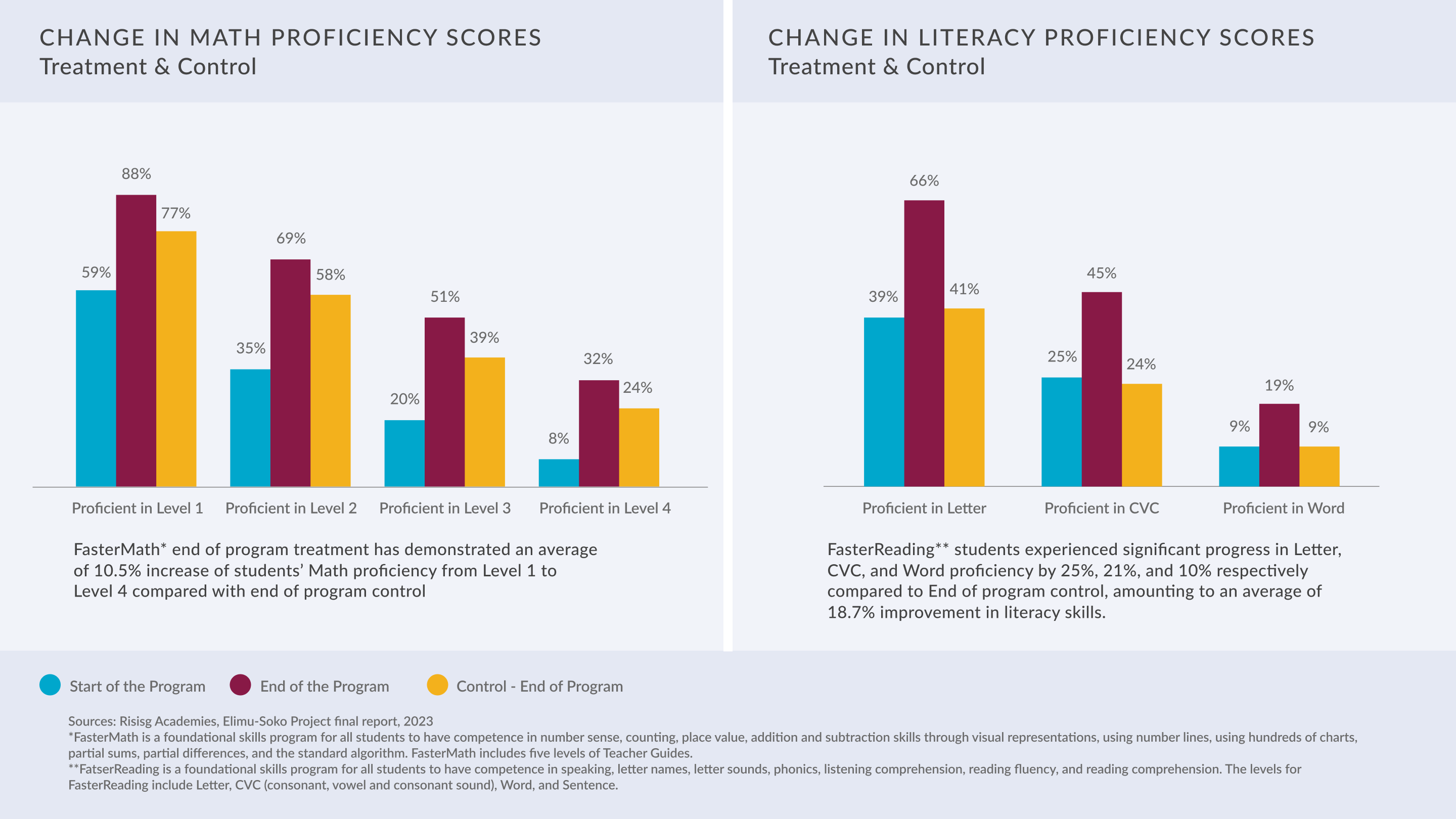Dalberg uses cookies and related technologies to improve the way the site functions. A cookie is a text file that is stored on your device. We use these text files for functionality such as to analyze our traffic or to personalize content. You can easily control how we use cookies on your device by adjusting the settings below, and you may also change those settings at any time by visiting our privacy policy page.
Many innovators are developing cost-effective solutions for boosting the quality of education. However, public financing is not always available to introduce these innovations in public education systems. Discover how Dalberg, in partnership with the Hempel Foundation, launched the groundbreaking Elimu-Soko program, which aims to unlock public financing for private-sector innovations. The first pilot in Rwanda increased foundational learning outcomes for over 18,000 students and is now being considered for full scale-up to a countrywide level.
Addressing Education Challenges in Rural Africa
Across rural Africa, educational challenges have persisted for years, particularly in underserved rural and marginalized communities. Over the past two decades, the focus of African governments has predominantly been on expanding access to education. Consequently, the bulk of historical government funding has been channeled toward infrastructure development and teacher salaries. But now that educational access is almost universal, governments are shifting their focus to improvements in educational quality. A number of cost-effective innovative solutions hold promise in elevating the quality of education, but these solutions are often absent in public schools, which educate over 80% of school-going children throughout the continent. Scaling these innovations in public school systems requires governments to pay for their scale-up. However, governments often require support in identifying and prioritizing their specific needs, and they lack awareness of available solutions as well as systematic processes to pilot and scale those innovations.
Navigating Scaling Challenges
One of the key challenges faced by innovative initiatives in Africa is scalability. Many innovations start as local pilots in a country – often in private schools – and they struggle to expand beyond their initial location. Engaging with government stakeholders and convincing them to pay for innovations can be daunting. Often the necessary political connections are lacking, especially for innovations that need to cross borders. Navigating government procurement systems is also challenging for innovators seeking to participate in a public procurement process. In the absence of accessible public financing options for enhancing education quality, innovators often rely on short-term philanthropic funding. While this approach enables them to pilot their solutions, it does not solve long-term financial sustainability.
Introducing Elimu-Soko
In the face of these challenges, Dalberg and the Hempel Foundation launched the Elimu-Soko initiative. The initiative supports governments in prioritizing challenges, identifying potential solutions, and piloting it. If the pilot is successful, the initiative helps the government scale up the programs using public financing. The Government of Rwanda, with a strong commitment to education, signed a Memorandum of Understanding with Elimu-Soko in 2022. Rwanda’s education sector had experienced rapid growth, boasting a 99 percent primary enrollment rate in 2019, although challenges persist in nurturing foundational skills among young learners.
The pilot, which ran from January to July 2023, has demonstrated remarkable success, surpassing the control group in foundational literacy and numeracy skills for over 18,000 learners.

Comprehensive Support from Elimu-Soko
Elimu-Soko offers comprehensive support to both innovators and governments. This includes pre-identification of government interest, simplification of procurement processes, commitment to scale-up financing from the government, ongoing government engagement, and localization support. The initiative also provides advisory assistance in identifying education quality priorities, technical support in procurement processes, financial backing for innovation pilots, and guidance in incorporating scale-up financing into annual budgets.
Knowledge Sharing
Elimu-Soko is now sharing insights from its pilot program with African countries, innovators, and funders through articles, conferences, and other means. As a result of this knowledge-sharing process, the Government of Zanzibar has now expressed an interest in piloting a similar program on its islands. The MoU was signed in September 2023 and the pilot will launch in 2024. The overarching theory of change embraced by Elimu-Soko is achieved through active engagement with governments, financial support for pilot projects, and the dissemination of knowledge and insights across the African continent. The key element of this approach is to identify government priorities in education quality improvement and to secure the commitment of governments to use public financing to address those priorities. The initiative then supports the government in identifying innovations that address priorities and in conducting and evaluating pilot programs. The methodology is versatile and is being considered to scale innovations at a national level. It shows potential to be implemented across different countries, and within various sectoral contexts. The initiative is reshaping the educational experiences for countless young learners in Africa by using public financing. It is also helping donors chart an exit pathway for their philanthropic investments, allowing them to focus their limited capital on experimentation. The success of this initiative could represent a systemic change in how governments pilot and scale innovations for public services, and how innovators secure sustainable financing for their innovations.

